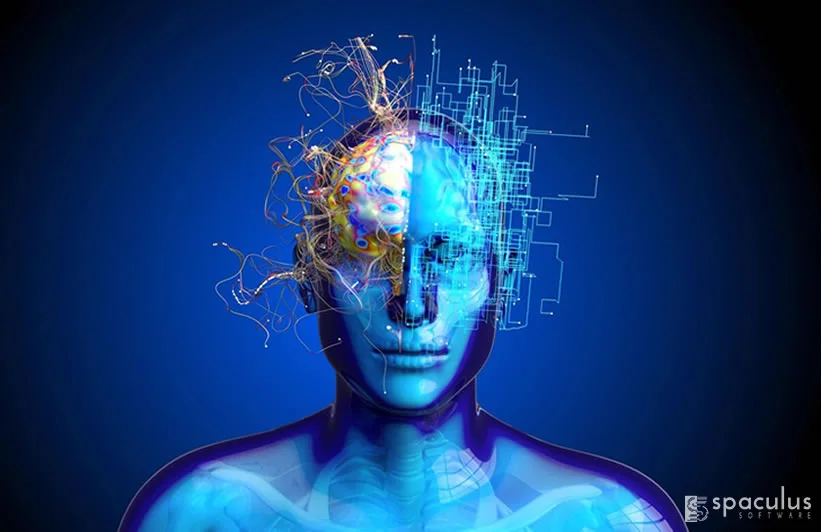
The domain of Artificial Intelligence is expanding exponentially since its inception. Recently, the major breakthroughs that have make AI progressive is its predictive analytics ability, NLG, speech and image recognition, improved automation and IoT integration. Most AI applications are ‘narrow’ type – focused on carrying out simple or complicated tasks with utmost efficiency.
Though digital assistants like Alexa and Siri are making our lives easier, some experts of the AI field doubt AI’s superiority over human performance. Hence, there is a constant debate over safety and security of employing AI machines. Also, it is possible that AI can’t offer same benefits in every industry process. The set of quick opinions on whether AI machines will dominate human existence often clouds the positive impact of AI.
Let’s dig deep into the fears, benefits and phobias growing in the AI market.
AI is believed to adapt to broader challenges of every industry and develop a powerful system that can learn quickly and automate business processes. It sounds like a fiction, but researchers think we can transform existing economical and social system with artificial intelligence.
For example, AI-powered self-driven car can automatically drive you from one place to another, considering the factors like ongoing traffic conditions, environmental factors, safety precautions, etc.
Based on accurate weather prediction from AI robots, you can even plan ahead your day and decide whether or not to wear jacket or carry an umbrella. The promises hidden in AI’s intelligent world are endless.
Improved efficiency
AI-enabled machines can take the charge of repetitive tasks, removing any scope of human errors while increasing overall efficiency and accuracy. Intelligent machines can work 24/7, avoiding the need to employ dedicated employees for consecutive shifts. AI-programmed chatbots can respond to customer queries themselves.
Work with high accuracy
AI machines can be taught to perform complex tasks like solving tough equations to obtain accurate results unlike human minds. Due to its undoubted accuracy, AI could be a solid solution in medical domain. Intelligent Robots can diagnose critical issues in human bodies and perform high-risk surgery with immense precision.
Affordable Cost
AI’s machine learning enables learning new things which doesn’t require writing new codes every time the need changes and reduces cost of training humans. Ongoing research is constantly helping improve AI’s learning capabilities. Machines perform all mundane jobs without taking breaks, which minimizes the cost of operations.
Analytical capability
AI-powered machines leave enormous amount of data related to the business processes. This data can be translated into deep insights with detailed analysis. Machines are now growing more independent and intelligent to perform analysis all be themselves.
Science fictions films often show robots invading their human creators. Some believe robots are here to steal our jobs. But it is hard to come to conclusion that they are that harmful. Here are the general fears about AI machines:
They don’t mean safety
The safety of having robots is frequently questioned saying that collaborative AI-powered robots used in manufacturing environment are unsafe. This is again mythical. The fact is that they are built with compliance standard of ISO TS 15066. Due to new safety technology, robots have restrained capacity when it comes to power, force, speed and hand guiding.
They will take human jobs
People also fear that AI technology will steal human jobs. This phobia is more pronounced in manufacturing industry leveraging automation technology. However, the technology has created new opportunities as companies can hire people to program robots or perform tougher tasks that robots can’t. Machines can take over mundane jobs and humans focus on more rewarding jobs. Technology, arguably, has created more than it supposedly destroys in terms of job careers.
AI can put human life in danger
Despite great progress in artificial intelligence, machines still lack human power of thinking. In the existing scenario, humans are still in control, which means the conceptual thought of robots endangering human life is too fantastical and wild. The concern is shallowly woven around near future, but we can’t see things beyond a decade.
Truthfully speaking, AI is actually appreciated for its role of everyday virtual assistant. it is popular and useful for household as well as business hassles. For instance, you can check weather updates, which is your morning routine. You just speak into your device and ask the AI-powered app:
“Hey, Alexa, will I be able to walk to my office without my umbrella?” OR
“OK Google, is it going to snow? Do I need to wear my jacket?
You can rely on these or other optional AI apps such as Siri, Cortana and many more. You may expect the smart, a little formal responses like:
“You may carry your jacket as it looks clouded. There is a possibility of a light snow fall anytime.”
AI-powered software supports this kind of friendly conversation to resolve your query and pass on healthy information.
AI is no longer just an incredible concept of Matrix or The Terminator. Tesla Motors has developed an autopilot technology with full autonomy to enabled vehicle to take over driving.
Online chatbots have started providing smart assistance for transactions and banking like financial advisors.
Associated Press is a media outlet uses computer program to make simple write-ups on financial reports, summaries, news and sports.
Some companies wish to build AI applications that provide personalized responses to relationship problems with synthetic emotions to improve credibility.
The central fear around AI is that it will grow into uncontrolled mechanism and invade the entire world.
Instead of believing in this illogical phobia, we should focus on how AI systems can help humans leverage information better. Humans have nothing to fear as there are several boundaries drawn around AI usage. The involvement of safety technology keeps robots at workplace in control.
Plus, the technology is created by human minds. Hence, any terrible consequence will be the cause of human programming errors. Proper ethical codes and compliance regulations can ensure risks are kept minimum.
Artificial Intelligence Insights and Trends